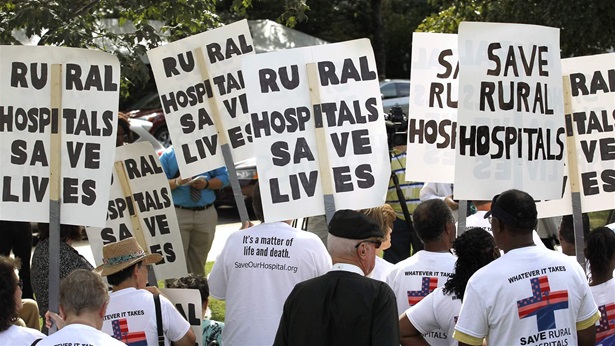Driving 100 miles to give birth

2015 march from rural Belhaven, North Carolina, to the state Capitol in Raleigh.
By Ellen Cohen
Women seeking abortions are not the only ones who often have to travel long distances to obtain care. Labor and Delivery (L&D) units all across the U.S., particularly in rural areas, have been shutting down, forcing women in labor to drive many miles to give birth. This may increase pressure on patients to schedule inductions or even C-sections, procedures that account for about 25% and 32%, respectively, of all U.S. births.
“Between 2004 and 2014, 179 rural counties lost or closed their hospital obstetric services. Consequently, fewer than 50% of rural women have access to perinatal services within a 30-mile drive from their home, and more than 10% of rural women drive 100 miles or more for these services. These conditions affect access to care before, during and after pregnancy and are more pronounced in the Black and Hispanic communities.” (tinyurl.com/2s4cm7hf)
Another 892 rural hospitals — more than 40% of all rural hospitals in the country — are now in danger of being closed, according to a March 4 article in Becker’s Hospital Review. (tinyurl.com/mkau8an4)
That article does not specify how many of these hospitals offer maternity care. However, L&D units are usually among the first to be closed down in financially struggling hospitals. Medicaid pays for 50% to 60% of rural births, and its reimbursement rates are lower than other insurers.
According to the March of Dimes, more than 2.2 million women of childbearing age live in 1,095 counties that have no hospitals offering obstetric care, no birth centers, no OB-GYN medical services or certified nurse midwives. (tinyurl.com/yr8fpfbz)
After the denial of federally protected access to abortion by the U.S. Supreme Courts, women, girls and other people who can get pregnant are being forced by many states to carry pregnancies to term, even in circumstances of rape, life-threatening conditions or extreme poverty.
But for many of those being forced to continue a pregnancy, there is little to no medical help available to guarantee their health and safety — or that of the child.
Ellen Cohen worked for 22 years as a certified nurse midwife in New York City hospitals, where she participated in research that led to the first breakthrough in preventing mother-to-child transmission of the HIV virus.

